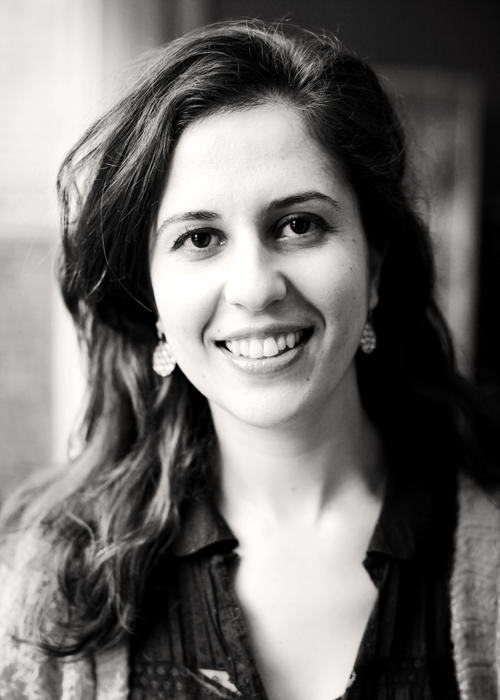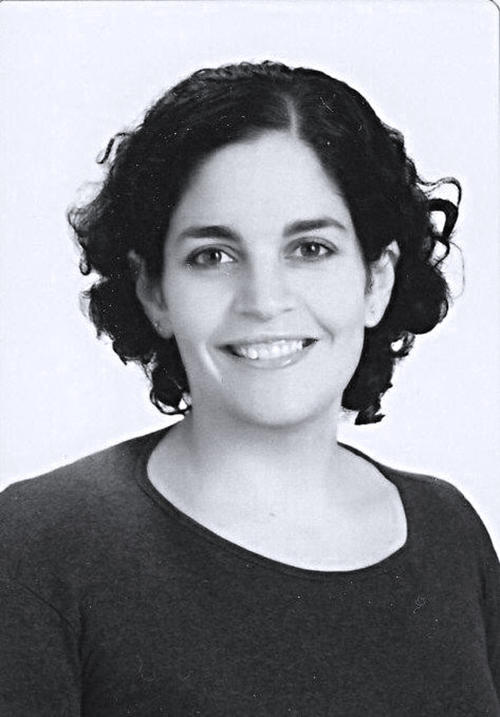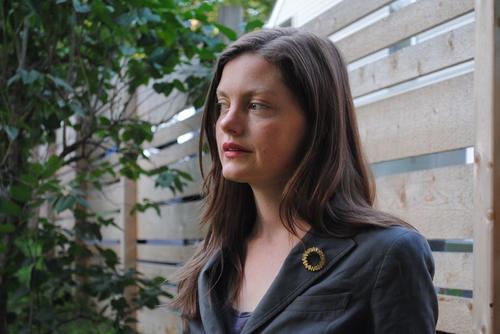Fellows 2015/16
Programm im Sommersemester 2016 (PDF)
Refqa Abu-Remaileh:* Resistance and Subversion in Palestinian Literature and Film: Seeking New Comparative Dimensions
Refqa Abu-Remaileh received her DPhil and MSt in modern Middle Eastern Studies, with a focus on Arabic Literature and Film, from the University of Oxford (2010, 2004) and her BA in English Literature from the University of British Columbia (2002). After completing her PhD, Abu-Remaileh worked with the Oxford Research Group’s Middle East Programme, a conflict-resolution organization focusing on the Palestinian-Israeli conflict. She created a new strategic thinking group involving Palestinian citizens of Israel. In 2012-13 she was a EUME fellow at the Forum Transregionale Studien in Berlin and will continue her work with a project on “Resistance and Subversion in Palestinian Literature and Film” as a EUME Fellow from 2014-2016 with a scholarship of the Alexander von Humboldt-Stiftung.
Subversion and resistance have been persistent throughout the different periods of Palestinian literature and film. Having gone through various iterations, the two elements combined were brought to the fore in the literary works of Emile Habibi and the films of Elia Suleiman, both of whom have had a deep influence on later generations. Without conventionally ‘telling’ the story of Palestinians, their works counter-narrate through inverted histories, silences, absences and disappearances. My doctoral thesis examined a creative fascination with a process of documenting in the works of Habibi and Suleiman and identified the ways in which their experimental and satirical works broke new aesthetic grounds in depicting the absurdities, paradoxes and ironies of the lives of Palestinians in Israel.
Inspired by new dimensions that emerged out of my doctoral research, my project aims, in the first year, to trace and contextualise elements of counter-narration and subversion across time periods and genres. In the second year, I will build on my findings to zoom out and analyse more broadly works of the post-Oslo generation of Palestinian writers and filmmakers. Using a methodology of close reading and formal analysis, combined with an understanding of the sociopolitical context, the focus on resistance and subversion can contribute to an understanding of the ways in which works challenge the hegemony of both the occupation and blind nationalism and renegotiate the meaning of collective memory, time, and history.
*EUME Fellow of the Alexander von Humboldt-Stiftung
Ela Gezen: The Turkish-German Left and Brechtian Aesthetics in Cold War Berlin
Ela Gezen received her MA in Central Eurasian Studies (Turkish) from Indiana University and her PhD in German Studies from the University of Michigan. Since 2012 she has been Assistant Professor of German at the University of Massachusetts Amherst. Her research and teaching focus on 20th century German and Turkish literature and culture, with emphases on literatures of migration, minority discourses, historical and theoretical accounts of transnationalism, and literary and cultural theory. She has co-edited two special issues, Colloquia Germanica (“Transnational Hi/Stories: Turkish-German Texts and Contexts”) and the Jahrbuch Türkisch-deutsche Studien (“Turkish-German Studies: Past, Present, and Future”), exploring new directions in Turkish-German Studies by expanding geographical, methodological, and temporal frameworks. In addition she has published articles on music and literature, focusing on the intersection between aesthetics and politics in both Turkish and German contexts.
As a EUME Fellow she will continue working on her book manuscript The Turkish-German Left and Brechtian Aesthetics in Cold War Berlin which will represent the first book-length study of Bertolt Brecht’s significance as an aesthetic influence and political interlocutor for Turkish-German literature and music. Her work examines how Turkish-German writers and musicians in Cold War Berlin drew upon Brecht’s theories of realism, epic theatre, and music, along with his dramaturgical practices, contributing to and transforming established German cultural practices of labor protest, realist representation, and workers’ song. Through careful consideration of texts by Aras Ören (1939-), Emine Sevgi Özdamar (1946-), and Tahsin Incirci (1938-), the book illustrates how Turkish-German musicians and writers constituted a transnationally affiliated, politically engaged aesthetic by citing and reimagining Brecht’s plays, poems, and songs in response to the political and cultural events that transformed both German and Turkish society during the 1960s and 1970s. Considering both text and context, The Turkish German Left reconstructs Brecht’s centrality to the Turkish-German cultural interchange in Cold War Berlin. At the same time, it demonstrates just how important Brecht's influence was for the literary, musical, and theoretical innovations that took place in Turkey during this same period.
May Hawas: ‘Lights Seen in Double Mirrors’: Worlding Novels in Egypt
May Hawas teaches English literature at the University of Alexandria, Egypt and is Associate Editor of the Journal of World Literature. She received her PhD in Comparative and World Literature from Leuven University. Hawas has various publications to her name including the Diaries of Waguih Ghali: An Egyptian in the Swinging Sixties (The American University in Cairo Press) and a number of short stories (Mizna: Journal of Arab American Art, Yellow Medicine and African Writing). She has extensive editorial experience and has worked in various NGOs for women’s issues and youth employment. Hawas has presented her work around Europe, the Middle East and the US, and has received awards and grants in the US, Belgium and Egypt. Her current research interests include the circulation of texts between the Middle East, Asia and Europe; methods of comparative and world literature; cosmopolitanism; literary history and canonization; and nation, nationalisms and the novel.
As a EUME Fellow Hawas will be delivering on various contracted projects on theories of world literature and world history in Arabic. She will also be revisiting two chapters of her thesis to turn it into a book.Originally entitled “World Literature, Contrapuntal Literature”, the dissertation draws on ideas from postcolonial and world literature, particularly the insights of core Anglophone, Francophone and Arabic postcolonial and world literature theory of the past fifty years, in order to examine key post-1960s novels in Arabic, English and French. The study aims to analyse the location of the Middle East, particularly Egypt, as image, production hub and cultural network in literature which circulated across pre-modern and modern ‘global’ routes from Europe (France, Czechoslovakia, Britain), the US, Asia (India, Iran), Russia and Africa (Zimbabwe).
Elizabeth M. Holt: Disseminating the Cultural Cold War in Arabic - The CIA, the Congress for Cultural Freedom, and the Literary Journal Ḥiwār (1962-67)
Elizabeth M. Holt received her PhD in Middle East and Asian Languages and Culture, and Comparative Literature from Columbia University in 2009. She is Assistant Professor of Arabic in the Division of Languages and Literature at Bard College, a small liberal arts college in the hamlet of Annandale-on-Hudson, New York, where Holt teaches courses in Arabic language, Arabic literature, world literature and translation, literary theory, and Middle Eastern Studies. Holt serves as Associate Editor of the Journal of Arabic Literature, a journal she has edited since 2008. She recently completed a manuscript entitled Novel Material: Speculating in Arabic from Beirut to Cairo, 1870-1907, an historical materialist study of the simultaneous rise of the novel form and finance capital in Arabic in the late nineteenth century. "Novel Material" reads an archive of periodicals, letters, first editions and private papers in Arabic and French, revealing how finance and the novel at once tell the other's story, a plotline of serialized hope and fear charted in the journals of Beirut through the silk market, and meted out in Cairo in cotton shares. Research for the manuscript was supported by a post-doctoral fellowship in Cairo in 2012 through the National Endowment for the Humanities at the American Research Center in Egypt.
Her project argues that our own present sense of the field of Arabic literature was produced through the strictures of American imperial power, and in particular the post-World War II inheritance by the United States of the colonial mantle of the French and British. Taking its center of historical gravity as the 1960s - a decade marked by the ascent and collapse of Arab nationalist politics, and the rise of the Sixties Generation of avant-gardist Arabic literature -, “Disseminating the Cultural Cold War” reconfigures our perspective on this decade by placing it in a continuum of American imperial cultural power extending both well before and well after the 1967 Arab defeat to Israel. With chapters on Palestine; Arabic book prizes and cultural capital; the 1960s Arabic literary scene in London, Beirut and Cairo; and the CIA's fondness for modernist poets, “Disseminating the Cultural Cold War”articulates the pressure that American empire persistently exerted and still exerts on the production, dissemination, and reception of Arabic literature.
At the center of the manuscript project is the Congress for Cultural Freedom's Arabic journal Ḥiwār, which published from 1962 until 1967.In April of 1966, the New York Times revealed that the CIA had covertly founded and funded the Congress for Cultural Freedom and its worldwide network of conferences, art exhibits, concerts and especially literary journals, inciting a range of reactions across the United States, Europe and the decolonizing world. While the episode was taken in stride by the Paris-based Latin American CCF journal Mundo nuevo, and left the Bombay-based Quest relatively unscathed, for the CCF's Arabic and African journals, the narrative was one of shock, scandal, and reproach, casting a long shadow over the very possibility of cultural freedom, one that persists in Arabic to this day.









